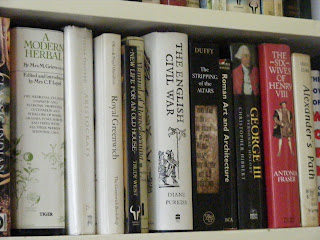What few booksellers ever admit is that books have a strange life all of their own; and dealing with the odd habits of the species can take many painful hours.
They breed.
They do.
And they move.
Many well-run households make the justifiable mistake of supposing that books should be corralled on bookshelves; neatly ordered - at least all facing the same way.

This, alas, is akin to assuming your Exmoor pony is happiest living in a stable all day and all night. He is not. It is not fair; and it is not fair to books either. Many of my books have to be firmly corralled, but all, when they come into the house, are free range. They live in the book's natural habitat: the heap. Books enjoy that closeness and feeling of pressure that you cannot get from the average bookshelf (unless horribly overstuffed; and that allows no room for movement, about which more anon). To replicate this habitat in your own home, I would suggest you cultivate your own heaps: beside the bed or a sofa are good and useful places which most books enjoy.

Hardbacks enjoy larger piles - paperbacks, being frailer creatures, prefer smaller heaps. Both types however, prefer some air space around each pile. This facilitates movement. I have seen this in the wild; my study. Heaps I have carefully arranged, with close attention to stability, will suddenly subside, pony book mingling with text book, and children's illustrated with modern first edition. I like to think of this as an illustration of the sociable, herd instinct of the book, and its natural attraction to chaos. Heaps arranged hurriedly, with scant attention to stabilty; progressing at strange angles are very unlikely to subside.

I try in my own study to aim for a compromise between my desire to maintain a vague idea of where a book is, and its own longing for chaos. It all comes down to careful herd management.
Careless herd management; with too much movement, seems to lead to breeding. When building piles up again, it is surprising how many books will emerge you never knew you had. The genetics of book production would provide an interesting study for someone.
Unfortunately for my books, natural herd management has to be curtailed after their early life with me; free to explore the floor, and the neighbouring piles. Although they might spend some weeks; in some lucky cases even months in this state of freedom, they eventually have to be broken in to a life of docility in the bookcase or storage box. Although I, like most bookdealers, try and manage this process carefully; treating the book gently at all times there are alas a few titles I fail with. The book appears just like its other herd members: docile, easy to handle - but beneath the covers its wild soul still rages.
An order comes in. I know I have not sold the book. The book is not where it was..... inadequately broken, and still longing for the freedom of its earlier experiences it has moved off in search of less ordered pastures. Like a careful shepherd losing its sheep, this worries the bookdealer, not least because of the awful prospect of having to write a grovelling letter to the orderee admitting you have lost the book, which is gadding about you know not where. Not all clients appreciate the volatile nature of the creatures we have to deal with.
And so, we spend hours (sometimes days) searching for the lost soul.
So sympathise with your bookdealing friends. Behind closed doors, they are dealing with much, much more than you ever thought possible.

4 comments:
What impresses me is the lack of dust on your bedside table!
That's because I had to move the bedside table to paint the floor, hence the lack of dust! Had you seen it before....
You painted the floor *specially for the photo*?!?? Wow! I'm so impressed I can barely speak!
Great post though. Far too little academic attention had been given to studying the behaviour and management of wild books. This is a major contribution to the subject. (And one, moreoever, entirely backed up by my own amateur findings.)
Juliet - nooooo - floor was painted as part of the Great Quest to sell the house...
I am glad though that your own research backs up my findings.
Post a Comment